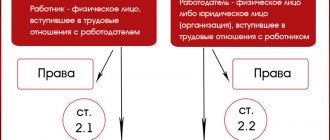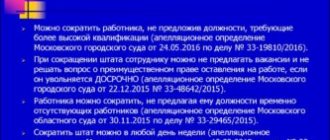The labor legislation of the Russian Federation considers various types of disputes that often arise between an employee of an enterprise and an employer, which cannot be resolved in a working manner, and concerning the application of labor legislation, collective agreements, and other documents on labor relations, as individual labor disputes.
Legislation requires recognition of labor conflicts that occur between an employer and a former employee of an enterprise who previously had an industrial relationship with a specific employer or another entity who wanted to sign an employment contract with him.
The Labor Code of the Russian Federation and many Russian laws clearly define a procedure that is most conducive to the resolution of individual labor disputes (ITS). The courts also deal with these types of issues. These authorities are guided by procedural regulations that are in force on the territory of Russia.
Subject of labor disputes
The subject that became the basis of the conflict is various issues, mainly related to:
- payment for work performed;
- conflicts regarding the imposition of disciplinary sanctions by the employer;
- receiving benefits and compensation;
- provision of paid and unpaid leave;
- changes in working conditions;
- application of labor legislation and other NAPs;
- recovery of damage caused to the employer, etc.
Labor conflicts also include service conflicts, the occurrence of which is possible while performing public service.
One of the participants in the ITS under Article 20 of the Labor Code of the Russian Federation is an employer, organization (legal entity) or other entity that has the right to enter into contracts with new employees.
The other party is the employee, an individual who is in an employment relationship with the employer.
The exception is citizens who previously had an employment relationship with a given employer, and citizens who had the desire to conclude such an agreement, but were denied such a right by the employer.
Separation of labor disputes and their basic principles
The classification and principles of consideration of labor disputes are quite important, as they allow us to consider in more detail their jurisdiction, the procedure for consideration and determine the basic rules and norms that guide the authorized bodies when considering them.
Labor disputes and conflicts between employees and employers can be classified on the following grounds:
- By subject composition
. Defined as disputes arising with a separate team or with an individual employee. - According to the type of legal relationship
that arose due to the conflict. Here, the subject composition will also be important, which includes employees, the employer, structures created within the enterprise (for example, trade unions), and authorities at the corresponding territorial level.
The principles of the disputes under consideration include:
- Full protection of all aspects
of labor relations. - Ensuring the use of legal methods
and correct rules of law when considering disputes. - Equality of rights of the parties
to the labor conflict that has arisen. - Possibility of seeking protection
from the competent authorities. - Openness
. - Objective
study of materials and evidence. - No fees
for dispute resolution.
“Article 393 of the Labor Code of the Russian Federation. Exemption of employees from legal costs
When filing a claim in court for claims arising from labor relations, including regarding non-fulfillment or improper fulfillment of the terms of the employment contract, which are of a civil nature, employees are exempt from paying fees and legal costs.”
- Ensuring the execution
of decisions made.
The listed principles must be applied in any dispute resolution. Otherwise, workers' rights will continue to be violated.
Who resolves labor disputes
In accordance with the requirements of Article 382 of the Labor Code of the Russian Federation, disputes arising between an employee and an employer are considered by specially created commissions at enterprises (CTS). The judiciary also has the right to resolve disputes of this nature.
When a resolution to a conflict issue cannot be made in a way that satisfies both parties to the conflict, the matter often ends up in court. The application may be submitted by one of the participants in the unresolved situation.
This opportunity is also provided to trade unions. This authority may initiate proceedings on the dispute through the court:
- if the trade union does not agree with the decisions made by the CCC;
- if an employee submits an application to the court, without using the opportunity to appeal to the CCC;
- when submitting an application to the court by a prosecutor who does not agree with the verdict of the CCC, which contradicts the requirements of labor legislation and other legal acts.
Options for resolving a collective labor dispute
Any disagreements must be resolved. In some cases, it is already possible to reach an agreement at the initial stage - when employees put forward demands and the manager satisfies them. Other disputes require more detailed consideration. There are two ways to resolve disagreements between workers and employers:
- creation of a commission;
- in a court.
These methods are used in this order. It is impossible to go to court without a local hearing.
Labor Dispute Commission
A commission is created if the manager did not agree and did not satisfy the demands of the employees. There are specific deadlines for the creation of the asset. The formation of the internal council is established by a special written document. It could be:
- order;
- resolution;
- order.
The commission includes representatives of both parties. The number of employees and managers is the same. Neither party has the right to refuse to participate or ignore it.
It is important to know! A certain period of time is allocated for consideration of requirements. During this time, the parties may or may not reach an agreement. At the end (regardless of the outcome), a written document is drawn up.
If everyone is satisfied with the decision, then the minutes indicate the deadlines for fulfilling the described obligations. If you are not satisfied, then there are two possible outcomes:
- involvement of an intermediary;
- arbitration.
The appearance of a parliamentarian is an optional procedure. The decision to involve him is made the next day after the signing of the protocol of the reconciliation commission. The mediator is selected by the parties involved within a certain time frame. If necessary, they can contact the local office of the Federal Service for Labor and Employment. If it was not possible to select such a person, then further negotiations are carried out in arbitration.
The selected mediator may request clarifications, documents and other information from the working group or management team. The person must not be interested. Based on the results of the commission with the parliamentarian, a protocol is also drawn up.
Court
Resolution of contradictions is possible in the created temporary labor arbitration or in a permanent one (if available). It is formed with the participation of the conflicting parties and the Federal Service for Labor and Employment. Labor arbitration has rights and obligations. These include:
- consideration of appeals;
- request for information, documents;
- receiving clarifications;
- decision-making.
The final document must contain the deadlines for implementing the provisions made, as well as the deadlines and methods of appeal, which are made to higher authorities.
Labor Dispute Commissions
These bodies are primary ones, the main function of which is to accept ITS for consideration at enterprises and in various teams. The initiators of the organization are the employees of the enterprises themselves or their representative body and the employer KTS (Article 384 of the Labor Code of the Russian Federation). Such commissions include a proportional number of representatives from both sides.
When the employer and employee representative body receive a written request to create this body, they are required to select and send their own representatives to the CCC within 10 days. Their appointment is the responsibility of the head of the enterprise or individual entrepreneur.
The party representing the interests of the members of the collective are the delegates nominated by its general meeting or elected by the representative body with their further approval at the general meeting of the collective. Such bodies can be created directly in any division of the enterprise on the same basis as the CTS of the enterprise. The commissions formed in individual divisions are in charge of reviewing ITS that have arisen in this division.
Competence of CTS
In accordance with Article 385 of the Labor Code of the Russian Federation, the CCC is called upon to search for solutions to disputes regarding violations of legislative standards on labor and other legal acts. The commission meets if a complaint is received from an employee of an enterprise, and if it is impossible to resolve the disputes on its own or with the involvement of a representative through negotiations between the parties to the conflict.
The employee has three months during which he can write a complaint to this commission. The term is calculated from the date by which he became aware or could have learned that his rights were violated in some way. Upon receipt of such an application, the CTS must register this application from an employee of the organization and consider it within a ten-day calendar period, calculated from the date on which the application was submitted.
https://youtu.be/yhsoFhA6CgY
Disputes between an employee and an employer are resolved with the direct participation of the employee who submitted his application. If he is unable to personally attend a meeting of the commission, his rights may be represented by a representative authorized by him. If neither the representative nor the applicant can take part in the work of this body when considering the application submitted by him, he may allow the commission to consider the controversial issue without his participation. To do this, you need to write a corresponding application and register it with the CCC.
If the applicant or his representative does not appear at the meeting where his dispute was to be considered, the meeting must be postponed. If an employee or his representative fails to appear again without compelling reasons, the CCC has the right to remove the issue from the agenda. But this fact does not deprive the employee of the opportunity and right to re-file the same dispute with the commission in accordance with the time limits provided for by the Labor Code of the Russian Federation - within three months.
The CCC has broad rights that allow it to carry out its activities within its competence, namely:
- invite specialists on issues relevant to the nature of the dispute;
- call witnesses to clarify the nuances of the dispute;
- demand from the employer or his representatives to present, within the time limits established by the commission, documents relating to a specific individual dispute.
A meeting of this body is competent if more than 50% of the members defending the rights of the employee and more than 50% of the members from the employer are present. During the work of the commission, a protocol is kept, signed by the chairman (deputy chairman). A document is considered valid if it is certified by the seal of the CTS.
Voting on these types of disputes is carried out secretly by a simple majority of votes of the present members of the CCC (Article 388 of the Labor Code of the Russian Federation).
Terms of consideration
Individual disputes between an employee and an employer are considered in court after the applicant’s application within 3 months from the date when he established or should have established that his rights were violated. If a dispute arose regarding dismissal - within 1 month from the day on which he was given the dismissal order or from the date on which he received the work book.
The employer has the right to go to court if the dispute concerns compensation by the employee for damage caused to the employer within 1 year from the date of discovery of such damage.
When considering in court disputes relating to such relations, related to non-fulfillment or improper fulfillment of the conditions stipulated by the employment contract, related to civil law cases, employees do not have to pay a fee or bear any other costs associated with litigation.
Conducting a strike
If the boss does not comply with the terms of the agreement or he ignores conciliation procedures in every possible way, then in this case the workers can organize a strike.
Moreover, participation in it is voluntary. And persons who force workers to participate in a strike or, conversely, agitate them against it, may incur disciplinary, administrative or criminal liability. In order for a strike to be carried out according to the law, it is necessary to notify the manager about it ten days in advance . This should be done in writing, and the decision should indicate the following points:
- the exact date of the strike and its duration;
- a detailed description of all disagreements that gave rise to a collective labor dispute;
- the name of the body that will lead the strike;
- composition of workers who will take part in it;
- a list of works and services that will be performed during the strike.
If this list is not indicated in the decision, then the court may declare it illegal. At the same time, an employee’s participation in a strike cannot serve as grounds for his dismissal. But the employer has the right not to pay wages to those employees who participated in it and did not perform the minimum work specified in the contract.
So the legislation that regulates labor disputes protects the rights not only of employees, but also of employers.
https://youtu.be/oj28TjmipXk
Resolution of individual labor conflicts in court
https://youtu.be/wolRcUivnVo
The jurisdiction of the judicial authorities also includes the consideration of conflicts upon receipt of complaints written by an employee regarding:
- reinstatement of the employee at work, regardless of the grounds on which he was dismissed by the employer;
- changing the wording of the reasons that led to the employee being fired, changing the date of his dismissal;
- transfer to perform other work;
- the issue of payment for forced absences by the employer;
- payment of the difference in wages when performing work paid at lower rates;
- the use of illegal actions or inaction of the employer when processing the employee’s personal information and its protection.
The court deals with the legal regulation of issues regarding applications filed by the employer, if there is a need to compensate for damage caused by the employee unless otherwise provided by law.
Judicial authorities accept applications for ITS for consideration if an employer refuses to hire a person without giving reasons. This authority also accepts claims from citizens who believe they have been discriminated against (Article 3 of the Labor Code of the Russian Federation). Such complaints can also be brought to court by citizens registered with an enterprise under contracts with employers who are individuals (not individual entrepreneurs), or religious organizations.
Labor disputes - types and causes
Labor disputes are disagreements that may arise between an employee or group of employees and a supervisor. Therefore, they can be not only individual, but also collective in nature. Such contradictions may arise when labor law norms are not observed or when participants in a legal relationship do not comply with the established requirements of regulations.
If the rights of one employee or an entire team were violated and this situation was not resolved pre-trial, then employees have no choice but to defend their case in a legal authority.
https://youtu.be/AUuUpy5zQJs
Disagreements between an employee(s) and a manager may arise for the following reasons:
- when an employee is delayed at work until the production task is fully completed;
- if the terms of the collective labor agreement are not observed;
- due to a violation of relations that are associated with the financial responsibility of the parties;
- if a person has received an illegal refusal to hire from an employer;
- due to non-payment of compulsory social insurance to an employee.
There are many other issues on which labor disputes may arise. The Labor Code of the Russian Federation, namely Chapters 60 and 61, describes in detail the procedure for their consideration. And also the Constitution of the Russian Federation states that workers have the legal right to strike.
https://youtu.be/CbnXvU_D-Zg
Other organizations considering ITS
Article 373 of the Labor Code of the Russian Federation provides for the possibility of participation of the State Labor Inspectorate in resolving individual disputes between an employer and an employee. This body is obliged to consider this dispute within 10 days from the date of filing a complaint against the decision made by the employer to terminate the contract or, if the trade union disagrees. If it is determined that the decision made by the employer is illegal, the State Labor Inspectorate is obliged to issue him an order in the appropriate form. This document is mandatory for execution by the employer. The employee must be reinstated at work. Absenteeism, which in this case is forced, must be paid by the employer.
Disputes between an employee and an employer are also considered if they are of an official nature. The implementation of this mission is entrusted to the state commission for official disputes. Individual unregulated service disputes between an employer and an employee or person may arise if a citizen:
- intends to enter the service;
- previously served in the service;
- has a dispute regarding the application of legislative documents, other normative acts relating to the performance of civil service and the fulfillment of contractual terms, which are reported to the body that considers such types of disputes.
Disputes that take place between employees of the prosecutor's office, internal affairs department and other authorities of a similar nature are accepted for consideration by higher authorities.
Entry is prohibited for the State Labor Inspectorate, or How to recognize the individual nature of a labor dispute?
In the process of labor relations, for objective or subjective reasons, conflicts may arise, and most often due to disagreements on issues of remuneration. The following can also provoke employee dissatisfaction:
- additional responsibilities assigned to him;
- non-compliance with the terms of the employment contract;
- lack of career growth and other reasons.
If there is no mutual understanding with management, a dissatisfied employee can file a statement (complaint) with the Rostrud authorities - and an unscheduled inspection with all possible negative consequences is practically guaranteed!
The State Labor Inspectorate, carrying out the function of supervision and control over the employer's compliance with labor legislation and other regulatory legal acts containing labor law norms, identifies offenses, but does not resolve labor disputes, since it cannot replace the bodies for considering individual labor disputes.
As stated in the Ruling of the Supreme Court of the Russian Federation dated July 20, 2012 No. 19-KG12-5, when conducting inspections, the state labor inspector issues a mandatory order for the employer to comply with only in the event of an obvious violation of labor legislation. An individual labor dispute is a type of dispute about the right (that is, the existence of a right or its violation is not recognized by both parties, does not follow from the law and is subject to proof). There are no signs of an individual labor dispute if the violations identified are obvious, indisputable and unambiguous.
In practice, conflicts with regulatory authorities arise on the issue of qualification of the causes of conflicts - what is it: an obvious violation of labor legislation or a labor dispute of an individual nature?
INDIVIDUAL LABOR DISPUTE
The concept of “individual labor dispute” is given in Art. 381 Labor Code of the Russian Federation. Thus, this type of dispute includes disagreements between the employer and employee on the application of:
- labor legislation and other regulatory legal acts containing labor law norms;
- collective agreement;
- agreements;
- local regulations;
- employment contract (including on establishing or changing individual working conditions).
An individual labor dispute is a dispute between an employer and a person who previously had an employment relationship with this employer, as well as a person who has expressed a desire to conclude an employment contract with the employer, if the employer refuses to conclude such an agreement.
IS LABOR LAW VIOLATION OBVIOUS?
Current legislation provides that the state labor inspector, upon identifying an obvious violation of labor legislation or another regulatory legal act containing labor law norms, is authorized to issue a binding order to the employer to eliminate the identified violations.
The obviousness of the violation means that the fact of violation of labor legislation or other regulatory legal acts is beyond doubt[1].
The principle of obvious violation of labor legislation is not observed if:
- the inspector’s conclusions are speculative and made without taking into account all the factual circumstances of the case
- All documents were not requested and examined from the employer[2].
Based on judicial practice, it is possible to determine how the principle of obvious violation of labor legislation “works” and by what criteria the individual nature of the dispute is assessed:
Analysis of the criteria given in the table allows us to conclude that an individual labor dispute requires that one party be given additional responsibilities, not directly provided for by law, that correspond to the rights of the other party. The inspector does not have the right to act as an arbiter between the disputing parties: to decide questions about the amount of wages paid, bonuses, the guilt of the person brought to disciplinary liability, the existence of grounds for dismissal, etc.
HOW TO PROVE THAT THE INTERVENTION OF CONTROL AUTHORITIES IS ILLEGAL?
Part 2 Art. 357 of the Labor Code of the Russian Federation, limiting the right of the state labor inspector to issue orders that are subject to mandatory execution, takes into account the delimitation of powers of public authorities, the special importance of judicial protection of labor rights and the mechanism for enforcing court decisions, aimed at ensuring the supremacy of the court in resolving a dispute about the law on the merits and preventing abuse the right to protection from violation by the employer of labor legislation or other regulatory legal acts containing labor law norms. Otherwise, it would mean that the state labor inspector could act contrary to a court decision that has entered into legal force[3].
In the case of inspection activities, it should be taken into account that the law gives the person being inspected (in this case the employer) the right to give explanations during the inspection, to provide objections to its results (Article 21 of the Federal Law of December 26, 2008 No. 294-FZ “On the Protection of Rights legal entities and individual entrepreneurs in the exercise of state control (supervision) and municipal control" (as amended on July 3, 2016)).
If the subject of the inspection has signs of an individual labor dispute, the employer can use the following recommendations :
- Draw the attention of regulatory authorities to the fact that the resolution of individual labor disputes is beyond their powers - they do not have the right to make decisions on them, resolve disputes on the merits, or issue orders.
- Provide a written justification for your position, describing the labor dispute on its merits, which will indicate its individual nature.
- If the inspector disagrees with the arguments presented, demand that his orders be declared illegal and subject to cancellation in court.
In order to protect against unjustified interference by regulatory authorities and the correct application of legal norms, it is necessary to accurately recognize an individual labor dispute in the subject of inspection, as indicated by the following signs:
- the dispute arose from an issue the solution of which falls within the exclusive competence of the employer and which, in accordance with the law, must be settled by agreement of the parties;
- to resolve the issue on the merits, it is necessary to examine additional evidence that the inspector does not evaluate, but the court has the right to request and examine;
- there is no violation of direct provisions of labor legislation.
[1] Decision of the Oktyabrsky District Court of Izhevsk, Udmurt Republic dated January 28, 2014 in case No. 2-1259/2014.
[2] Decision of the Oktyabrsky District Court of Arkhangelsk in the case of June 26, 2014 No. 5293/2014.
[3] Determination of the Constitutional Court of the Russian Federation dated October 27, 2015 No. 2454-O.







